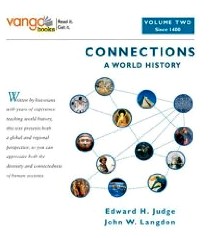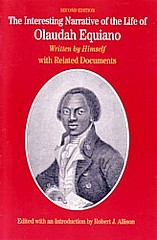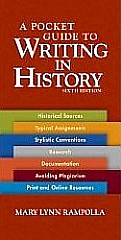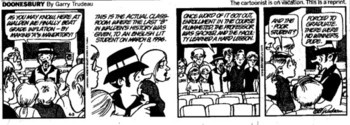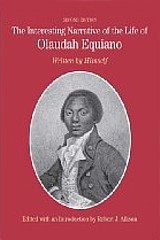- 7/13/04: The on-line journal World History Connected
(homepage)
has some excellent articles for teachers. Next time I teach this course
I'm going to start the course by discussing this June 2004 article about
the fundmental approaches found in world history textbooks: Tom
Laichas, "History and the Textbooks". I think it lays out
very clearly one of my goals for this college-level required introduction
to the discipline of history, namely to help us recognize our underlying
assumptions in the ways we conceive of our world. We are not teaching The
Truth, but how to find principles that can guide our understanding about
how and why things happen, then and now. It would be fun to have each TA's
sections take one of my EIEIO/C causes (see L1
outline) and make arguments for it as the writing assignment.
By the way, I find that William Everdell's article "How
To Use the Theme Of Technology in Teaching the World History Survey Course"
offers some insightful new approaches for examining some of the tried-and-true
events of world history.
- 9/28/04: After seeing the film Outfoxed
(official Outfoxed
site) about how the Fox "News" network systematically obfuscates
opinion and fact, I think historians need to focus more than ever on teaching
students how to assess the reliability and relevance of their sources.
This is a step that would precede the interpretation of primary
source material, which many World History courses (and
the notorious DBQ) emphasize. 11/10/05: here are some good sites:
- Sept. 29, 2004: I found an interesting and very comprehensive
teaching site developed since 1999 by Alexander Ganse, a German historian
teaching World History at an elite school in South Korea, "World
History at KMLA" (Korean Minjok Leadership Academy) hosted by
the Center for Instructional Media (ZUM) in Germany. It is in English,
and especially the links seem to be excellent and unique (that is, not
the usual top 3 google results).
- Oct. 2, 2004: Well-designed lesson
plan about the genocide in Darfur, Sudan, at newzcrew.org, which is
run by Global Kids and NewsHour Extra. Global Kids is a New York City-based
educational organization that supports urban youth to become global citizens
and community leaders. NewsHour Extra is the student section of the Online
NewsHour, the Web site for PBS's daily news broadcast, The NewsHour with
Jim Lehrer.
- Jan 7, 2005: World History Connected (homepage)
has an excellent newsletter with many interesting articles. See, for instance,
this
2004 special issue on Africa, and the index
of issues.
- April 7, 2008: The 2c
course demographic survey is now ready: please take it--the 10 radio
button/check box questions should take you only a minute or two. Thanks!
(report
log-in)
- April 9, 2008, 11am : I've responded to the things
you wrote in the "free response" question on the survey. See
the forum on the course
Sakai site. (Link also in dark green box of menu bar above) . Log in
with your UCSBnet ID, then click on this course in the blue menu bar going
across. Then select "Discussion and Private Messages" on the
vertical bar." So far 251 people have taken the survey--I'm hoping
for 75% (375-400 responses) by tonight.
- April 15, 2008: Policy on the extra credit films.
In the interest of fairness, the TAs are willing to do the extra administrative
work for students who can't attend the showings at the MCC. However, you
will have to do a little more work (writing). So here are the policies:
- If you can attend the showing at the MCC, just jot down your name,
the film title, and a few notes on the index card Anil distributes, and
give it to your TA. That will get you credit.
- If you canNOT attend the showing, you must obtain the film on your
own and watch it. In some cases (namely if UCSB, the prof, or a TA has
a copy) a copy may be placed on 24 hour reserve at the library. This may
be a VHS copy, however (Amistad is).
- You should show your TA a copy of your class or work schedule that
shows that you have a conflict. (We really prefer that you attend the showing
if possible.)
- You must type and submit to your TA: a 1-page (ca. 250-300 word) answer
to the question: How have the concepts presented in the course helped me
to understand the film? Or: How does the film reflect the concepts taught
in the course?
- You must do this within one week of the official showing time and get
the card to your TA in section or lecture. (Do not come with a bunch of
cards at the end of the quarter!)
- Finally, if you know any films that you'd like to suggest, please e-mail
the prof or ask your TA to pass on the suggestion. Thanks!
- June 10, 2008: Sample
papers page with 4 prizewinning papers now available, and (finally)
the results of the midterm
survey.
- June 24, 2008: Here is the overall grade distribution
for Spring 2008 (468 total students):
| A+ 8 |
B+ 59 |
C+ 30 |
D+ 4 |
F 9 |
| A 51 |
B 117 |
C 36 |
D 2 |
withdraw/incomplete: 2 |
| A- 77 |
B- 68 |
C- 5 |
D- 0 |
mean grade: 85.4 (w/o Fs) |
| 29% got As |
52% got Bs |
15% Cs |
1% Ds |
|
- June 25, 2008: I've started a World
History Feature Films page.
- Sept. 3, 2008: Now some bloglike thoughts on how to
restructure the course the next time I teach it. Number 1: refuse to teach
it in Campbell Hall. The entertainment venue is not at all conducive to
the more demanding, less entertaining way I conceive of my courses, as
the comments on the student evals (and RateMyProfessor) bear out. [scan
ESCI form when it resurfaces]
- Sept. 10, updated Sept. 21, 2009:
- The books for Fall 2009 are:
- Textbook: Edward Judge & John Langdon, Connections,
A World History (Pearson, 2009), vol. II (chaps 19-37). This textbook
strikes a good balance between conciseness, depth, coverage, and readability.
($60
at amazon, $64 UCen)
Website: http://wps.prenhall.com/hss_judge_connections_1mylab/.
First you must register, with an ID that I think comes with the purchased
textbook.
Try registering for GradeTracker--the Class ID is cm293386.
Use the "chapters" navigation for pre-, post- and chapter quizzes.
- Olaudah Equiano, The Interesting Narrative of the Life of Olaudah
Equiano, or Gustavus Vassa, the African (1789), (Bedford 2006 ed.,
edited and introduced by Robert Allison). This autobiography of a former
slave played an important role in the antislavery movement. ($14/9
used at amazon)
- Mary Lynn Rampolla, A Pocket Guide to Writing in History
(Boston: Bedford, 6th ed. 2009 [earlier editions ok]). This is an excellent
how-to guide about writing history papers and preparing for exams. ($16
at amazon)
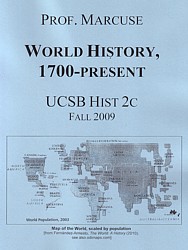
- iClicker: Classroom response unit ($30/23
used at amazon)
- Reader of additional essays and sources, available at GrafikArt on
Pardall Rd. in IV (90 pages).
- All books except the course reader are available in the library
reserve room.
- We will be using a GauchoSpace
course website for this class.
- The TAs for this course are:
- Sept. 16, 2009: 2008
chat room midterm & final review sessions archived
- 9/23/09, 9pm (links updated 9/24, 5pm). Sept. 24:
First day of class: although I had previously been on the fence about
canceling class completely on the Sept. 24 Day of Action (I thought I'd
use most of the time to relate course content to the issues at hand), the
UC Administration's intransigent stance and adding insult to injury by
raising students fees a huge amount, I've decided I must participate in
the strike action instead. You'll find me during class time on a picket
line on the west side of campus, perhaps the Pardall corridor.
- I usually use the first day of class to pass out and explain the syllabus,
introduce myself and the TAs, take care of administrative matters, and
ease into the course content. This year, all material will be posted on
this website: Fall 2009
Hist 2c syllabus (pdf,
doc),
web version of intro lecture (2006
narrative, 2008 ppt).
You can purchase your course books already (the course reader, required,
will be available at GrafikArt (hours)
on 6550 Pardall Rd. in IV by Friday noon, $10.43), since we will hit the
ground running next Tuesday, 9/29.
- I'm sorry if I've made your start of classes more stressful and chaotic
than usual. I think and hope you and thousands upon thousands of future
UC students and California residents will benefit from this action. As
Chancellor Yang told the Regents on 9/16, it's time to start DEFENDING
the university, instead of DEFUNDING it. For more information, see
the News items on the History dept.
homepage.
- I'll send an email with this information to all enrolled students and
those who've contacted me about wait lists once the syllabus is available.
- Sincerely,
Prof. Marcuse
- 9/24/09, 7am: No office hours today, but I'll hold special office
hours this Friday and Monday, noon-1pm, HSSB 4222. (Friday I must leave
at 12:50.)
- The
Honors Section has been cancelled due
to budget reasons--I'm very sorry.
- 9/24/09, 7am, updated 5pm: "Crashing" Hist
2c. There is very little chance that this will be possible. If you
want to try anyway, here's what to do:
- sign in at the first lecture on 9/29, as attendance at lecture is the
first prerequisite of getting on ANY waitlist
- go to a specific section that you want to crash, and put your name
on a waitlist there.
- You must go to ALL sections you want to crash. Exception: if the same
TA teaches multiple of your chosen ones, ask him/her to add your name to
another list as well.
You can check which TA teaches which section in the table on p. 3 of the
syllabus. No need to or benefit from contacting
them in advance.
- Bring documentation of priority reasons. I have asked TAs to consider,
in order:
- students who were once enrolled in this course and were dropped because
financial aid came through too late (applies for any section, not just
the original).
- History majors, or majors in dept's that require this course (bring
a transcript printout that shows your declared major)
- Seniors in majors (like bio or engineering) that have so many prerequisites
that they could not have taken GE courses in their first years at UCSB
- Students with other valid, documented reasons why they must take this
course THIS QUARTER. (2A and B are offered in W, 2C in Spring, by Prof.
Spickard, who's more fun than I am)
- Within these categories, students who emailed the prof. prior to
today, 9/24, will be rank-ordered by date of email, otherwise within
a category by lottery. If you don't have a saved copy of your email, note
on the waitlist sheet approx. when you emailed me, and I will verify that.
- Sept. 26, 2009: The first film in the extra credit film series
(see syllabus p. 3) will be:
- Paradise Now (2005), 90 mins. It will screen at 7pm on
Wed. Oct. 5 in the MCC theater. (preview
on Netflix: it's about 2 suicide bombers assigned to Tel Aviv)
- I'm also starting World History Links
and World History Books pages to archive
materialsI come across and want to include in future topical pages.
- 9/28/09: some new items uploaded: 2009
syllabus, 2009 Reader TOC,
TA schedule grid
- 9/30/09: Lecture
1 pdf now available [Thu.
11 am: it's here](4 pages with 23 slides).
- Policy on switching sections: First
you need to find a "buddy" in the other/target section. Then
this requires a form that you can get from your TA, to be filled out by
BOTH students and initialed by the TAs.
- Again, the
Honors section is cancelled. Sorry,
budget cuts, no resources.
- The final exam date on the syllabus
is incorrect. I put in the exam slot for TR8-9:15PM. Our
correct exam time is Friday, Dec. 11, 8-11am.
- The online Reader TOC has
links to online versions of this week's section readings.
- iClicker registration: You do this on the iClicker
website. Use your perm for the student ID. More info in class; if your
serial number (remote ID) is rubbed off, don't worry, see the prof. next
week.
- 10/1/09: Crashing update: 22 spaces
have opened up, and 14 people have the prerequisite of having attended
the first two lectures. Thus depending on circumstances a few students
without the full prereqs may be able to get in. See the 9/24 announcement,
below for the policy.
- Lecture 2 pdf now available:
Haitian & Industrial Revolutions (5 pages with 29 slides). Note: the
comic text (slides 3 & 4) is a bit small, but if you zoom the pdf (on
a computer) to 150%, you should be able to read even that.
- 10/8/09: PDFs of this week's lectures now available:
- L3: Theory & Model of Causes; Industrial Rev & Slavery 1: 4
page PDF with 21 slides
L4: Slavery 2, begin Antislavery: 7
page PDF with 39 slides
- iClicker registration. 131 students have not registered
a clicker yet; 60 of them have never clicked. Please do this!
Here's how to do it:
- Go to the following web site: www.iclicker.com/registration,
then:
- Enter your First Name and Last Name in the appropriate fields.
- Enter your PERM in "Student ID"
- Enter your i>clicker "remote ID" (this is the unique set
of numbers and letters located on the bottom of the back of their remote).
- Enter the security/verification code that appears on the screen. This
verification image will appear as a slightly distorted series of numbers
and/or letters (and is used to keep spam bots from submitting the form).
- Click “Enter.” You will see an on-screen message confirming
that registration was successful. Your ID is now tied to your unique i>clicker
remote ID.
If your Clicker code is rubbed off, see the professor.
If you registered after August 2008, your registration
is still valid.
- 10/12/09: Various announcements:
- Uploading to GauchoSpace: There is now a "dummy" assignment
on GauchoSpace
if you want to try out uploading a random file, since an electronic version
of the Equiano paper must be uploaded by the due date next Tuesday, Oct.
20. I will give you a grace period, however, instead of 8am, when the hard
copy is due, you must upload by 6pm before the late points accrue.
- Extra credit film policy (we don't have a regular time yet):
you MUST attend the screening in order to receive credit, unless you have
a documented class or work conflict. The prof will try to put the films
on reserve for those with conflicts, and others are free to watch them
but won't receive credit. Index cards must be given to your TA within one
week.
- Extra credit for attendance of Oct. 14 teach-in events (schedule):
1pt for a 1/2 - 1 page summary description of the event, including what
you learned from it. This would count as one of the films (3 total for
credit).
- Have the H1N1 flu? If you don't know someone who can fill you
in about lecture, ask your TA to find someone in your section who can share
their lecture notes with you. After you are well, of course.
- 10/15/09 (updated 10/16/09): PDFs of this week's
lectures now available:
- L5: Latin American Independence Movements: 3
page PDF with 18 slides
L6: Latin America cont'd, Teach-In, Anti-Slavery: 6
page PDF with 24+12 slides.
NOTE: I've included the final 12 slides not shown in lecture
because we instead took the time to discuss some of the presentations at
the teach-in. I may try to fit them into a later lecture.
- Please register your iClicker ASAP! See instructions under 10/8
announcement, below.
63 enrolled students have not registered; 42 clickers used in class were
not registered. What's with the other 21?--I know two don't have their
clickers working yet.
- 10/19/09 (updated 10/20): A student has asked
that I post a full-page-size version of the EIEIO causality model for midterm
study purposes. A great idea! I've consolidated all of the related ppt
slides into one file
and post it now as EIEIOslides.ppt; I'll convert
and post it as a pdf later in the week.
10/20/09: here the pdfs: 5
full-size and 1 page with 6 small images, or 9
full size slides.
- PS. good luck finishing up your papers. Don't forget to upload
to Gauchospace when done. Don't forget the word count, and
note that you MUST draw your evidence from Equiano's writing (38-222),
NOT from the introductory sections (pages 1-35). If you cite only passages
from the introduction, you might get at best a "D". (I'm emailing
this to everyone as well.)
- Various events are coming up:
- extra credit film Twilight Samurai will be shown at
the MCC on Tuesday, 1-3:15pm
- extra credit evening event: "How the US can bring Arabs &
Israelis together," Wednesday, 8pm, Campbell Hall (free--dialog between
two experts)
- Note on paper: Check the prompt on syllabus
p. 2: be sure to include your Word Count.
- 10/20/09: Register your iClicker NOW! Instructions
given on 10/8, below.
Note 10/22: the iClicker company informs us that they purged their database
in July 2009, so if you registered on the web before then,
you need to do it again.
- 10/23/09: Midterm online review session times are Mon.
5-6pm, and Tue 8-9pm. The forum will be on this
GauchoSpace chatroom .
- L7: China and Imperialism: 7
page PDF with 37 slides (last slide also in L8)
L8: Japan and Imperialism: 9
page PDF with 54 slides (includes 5 slides on UC's future).
- iClicker update: 35 clickers have no student names, 47 student names
have no associated clickers, 2 clickers are defective. That means 10 students
aren't participating--if you're one of them, please let me know why! List
of 47 unregistered students
- Is your clicker not functioning? Tech support suggests trying all 3
new batteries, and NOT Duracell (they are a tad shorter), but Energizer.
That solves the problem on most clickers sent in for warranty repairs.
- Midterm review sheet: I'll email you when it is available,
probably sometime Saturday.
- 10/24/09 (html on 10/25): Midterm
Study Guide now available, with printable 1
page .pdf
- 10/27/09: Just finished the second chat review. Here's how to
access them:
- 10/28/09, 9:30am: L9: Imperialism in India (6
page PDF with 35 slides) now available.
- 10/27/09: I'll upload the slides from L9: India and Imperialism
around 10am tomorrow (Wednesday). 6
page PDF with 35 slides.
- iClickers: As of 10/27, there are 29 unregistered clickers and
36 students who don't have a clicker registered. Those 29: please register
by 11/5 or you will begin to forfeit points. Of the 38-29=7 difference,
I think 4 may have dropped the course, but I would love to hear from the
rest of you why you don't want to participate in this aspect of the course.
Here is the list of unregistered clickers. List
of 36 no-clicker students.
[update 11/2: 26 ownerless clickers; 34 clickerless students]
- Clicker serial number: I noticed on my own clicker that my serial
number is beginning to rub off. I put a piece of clear tape over it, as
the company recommends. You may want to do the same, since they clearly
haven't fixed this bad ink problem yet.
- 11/3/09: L11: World War I (5
page PDF with 30 slides) now available
- And here is the Family History Essay handout (1
page pdf).
- Extra credit film Gandhi showing at the MCC, Wed. 11/4, 1-4pm.
- 11/5/09: L12: Consequences of Crisis of European Global
Order (5 page pdf) now available.
NOTE: the last page of 6 slides was not shown in lecture, is included
for reference.
- Extra Credit Event tonight: SPEAK TRUTH TO POWER
Thursday, November 5 / 8:00 p.m. / Free, UCSB Campbell Hall
Kerry Kennedy founded the Robert F. Kennedy Center for Human Rights to
ensure the protection of rights codified under the UN Declaration of Human
Rights and to address problems of social justice in the spirit of her late
father. She also serves as chair of the Amnesty International USA Leadership
Council. Kennedy is the author of Speak Truth to Power: Human Rights Defenders
Who Are Changing Our World, which features interviews with human rights
activists such as Helen Prejean, Marian Wright Edelman, the Dalai Lama,
Desmond Tutu, Elie Wiesel, and Oscar Arias. Speak Truth To Power has evolved
from a book exploring the quality of courage into a global education initiative
aiding the fight for international human rights.
As usual, you will need to do a 1-page write-up in order to receive
credit.
- 11/16/09: Powerpoint pdfs of L13:
World War II and L14: Cold War
now available, as well as of Eric's
presentation about his oral history project. Eric's proposal, interview
transcript and his paper are available as well, but only on the GauchoSpace
site.
- 11/17/09: PPT pdf of L15:
Isms & China now available (30 slides, of which 3 were skipped)
- The remaining extra credit films (all at the MCC):
Tue, 11/17, 1-3:15pm: Seven Years in Tibet (WW2 India & Tibet,
China & Dalai Lama
Thursday, 11/19, 2-3:45pm: Persepolis (1979 Iranian revolution)
FRIDAY, 12/4, 2-3:30pm: Born into Brothels (contemporary
India)
- 11/19/09: PPT pdf of L16:
Latin America now available (36 slides on 6 pages; 21 shown in lecture,
remainder will be covered next Tuesday)
- 11/16/09: Powerpoint pdfs of L13:
World War II and L14: Cold War
now available, as well as of Eric's
presentation about his oral history project. Eric's proposal, interview
transcript and his paper are available as well, but only on the GauchoSpace
site.
- 11/17/09: PPT pdf of L15:
Isms & China now available (30 slides, of which 3 were skipped)
- The remaining extra credit films (all at the MCC):
Tue, 11/17, 1-3:15pm: Seven Years in Tibet (WW2 India & Tibet,
China & Dalai Lama
Thursday, 11/19, 2-3:45pm: Persepolis (1979 Iranian revolution)
FRIDAY, 12/4, 2-3:30pm: Born into Brothels (contemporary
India)
- 11/19/09: PPT pdf of L16:
Latin America now available (36 slides on 6 pages; 21 shown in lecture,
remainder will be covered next Tuesday
- 11/24/09: Essay due date extension, request for survey, final
exam date
Before you leave for Thanksgiving break, a few announcements:
- After consulting with the TAs, we decided that it would be ok to extend
the paper due date until Thursday, Dec. 3 (8am),
so you have more time to write after Thanksgiving break
- Also, I have a survey I'd like you to take. The 15
questions (3 multiple checkbox and 12 single answer "radio button")
takes less than a minute to complete. It is anonymous, and I appreciate
your candid answers.
Please do respond, this is valuable information for me. Here is the link:
http://www.feedbackfarm.com/surveyengine/s.php?i=3e4
After you finish, you'll see links to previous years' survey results. [2009
survey results]
- As I announced in September, the Final Exam date in
the printed syllabus is incorrect. That is the time slot for courses that
meet TR at 8*p*m. The slot for TR 8am courses is: Friday, Dec.
11, 8-11am. That is the correct time.
- PPT pdf of L17: Middle East
now available (30 slides, 23 shown)
- Thanks for doing the survey, and have a good break!
- PS. If anyone is interested in my use of the clickers, here's an overview
of all the clicker question slides with their results, with a couple
slides of analysis at the beginning (7
page/42 slide PDF). I have to admit that I don't feel I've used them
very effectively--we'll see if I can do better in the final class sessions.
- Dec. 1, 2009: PPT pdf of L18:
21st Century Problems now available (24 slides on 4 pages)
- Dec. 10, 2009, 2:30pm: GauchoSpace tech support was
able to retrieve the lost chat answers I posted around 9pm Wed. evening--after
the long 5-6pm session, and before those two brief 9:15pm fragments with
Ritesh. (direct
link to archived chat) They may reappear there if the tech is able
to restore them, but in any case here they are:
- I'm just checking
in to comment on a few things that came up in the earlier chat session
this evening.
- In the discussion
of Islamic nationalism the word "reformism" came up. I'm not
sure what that means--I wouldn't associate it with either type of Arab
nationalism
- As for "globalization,"
you might think about what happens to countries that aren't part of it
(see Three Worlds model developed since the 1970s on economic criteria)
when discussing its world-historical significance (but you don't HAVE to)
- For the third
essay question, you only need THREE total examples, not 9. An "A"
answer will need to argue why some of those causal factors were more important
than others, perhaps also more important in one century than another.
- Liberalism: no,
you don't need to define all 8 for the 20th c, but there are some common
themes, and some are more important than others. You should be able to
say why some of those types (or common features) are significant for world
history.
- For "critical
history" you don't have to discuss N's other types in detail, but
it may help to define critical by saying what it is not (and thus mentioning
the other types briefly)--again, most important is that you can relate
that concept to some other things in the course to show why it is significant
- Just finished
reading through the earlier session. Boy was there a lot of confusion on
what a "choice" meant! I hope that is clarified now. Earlier
returns: 22 for section II, and 76 for section III. If that holds til tomorrow:
I will decide which of 1 OR 2 is on the exam, and both 3 and 4 will be
there, and you can choose which of 3 or 4 you answer.
- Good luck studying--bye.
|

